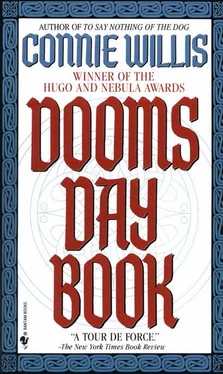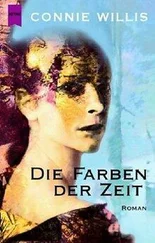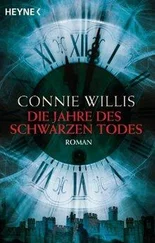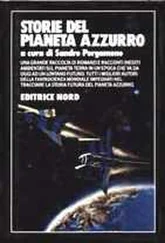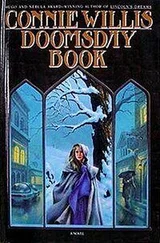“The map says Skendgate is five kilometers from Henefelde,” Colin said, wiping snow off the locator, “and we’ve come at least four, so we’re nearly there.”
They were not nearly anywhere. They were in the middle of the Wychwood, on a cowpath or a deer trail. It would end at a cotter’s hut or a salt lick, or a berry bush the horse had fond memories of.
“See, I told you,” Colin said, and there, past the trees, was the top of a bell tower. The stallion broke into a canter. “Stop,” Colin said to the stallion, pulling on the reins. “Wait a minute.”
Dunworthy took the reins and slowed the horse to a reluctant walk as they came out of the woods, past a snow-covered meadow, and to the top of the hill.
The village lay below them, past a stand of ash trees, obscured by the snow so that they could only make out gray outlines: manor house, huts, church, bell tower. It wasn’t the right village—Skendgate didn’t have a bell tower—but if Colin had noticed, he didn’t say anything. He kicked the stallion ineffectually a few times, and they rode slowly down the hill, Dunworthy still holding onto the reins.
There were no bodies Dunworthy could see, but there were no people either, and no smoke from the huts. The bell tower looked silent and deserted, and there were no footprints around it.
Halfway down the hill, Colin said, “I saw something.” Dunworthy had seen it, too. A flicker of movement that could have been a bird or a moving branch. “Just over there,” Colin said, pointing toward the second hut. A cow wandered out from between the huts, untied, its teats bulging, and Dunworthy was certain of what he’d feared, that the plague had been here, too.
“It’s a cow,” Colin said disgustedly. The cow looked up at the sound of Colin’s voice and began to walk toward them, lowing.
“Where is everybody?” Colin said. “Somebody had to ring the bell.”
They’re all dead, Dunworthy thought, looking toward the churchyard. There were new graves there, the earth mounded up over them, and the snow still not completely covering them. Hopefully, they’re all buried in that churchyard, he thought, and saw the first body. It was a young boy. He was sitting with his back to a tombstone, as if he were resting.
“Look, there’s somebody,” Colin said, yanking back on the reins and pointing at the body. “Hullo there!”
He twisted around to look at Dunworthy. “Will they understand what we say, do you think?”
“He’s—” Dunworthy said.
The boy stood up, hauling himself painfully to his feet, one hand on the tombstone for support, looking around as if for a weapon.
“We won’t hurt you,” Dunworthy called, trying to think what the Middle English would be. He slid down from the stallion, clinging to the back of the saddle at the abrupt dizziness. He straightened and extended his hand, palm outward, toward the boy.
The boy’s face was filthy, streaked and smeared with dirt and blood, and the front of his smock and rolled-up trousers were soaked and stiff with it. He bent down, holding his side as if the movement hurt him, picked up a stick that had been lying covered with snow, and stepped forward, barring his way. “ Kepe from haire. Der fevreblau hast bifallen us .”
“Kivrin,” Dunworthy said, and started toward her.
“Don’t come any closer,” she said in English, holding the stick out in front of her like a spear. Its end was broken off jaggedly.
“It’s me, Kivrin, Mr. Dunworthy,” he said, still walking toward her.
“No!” she said and backed away, jabbing the spade at him. “You don’t understand. It’s the plague.”
“It’s all right, Kivrin. We’ve been inoculated.”
“Inoculated,” she said as if she didn’t know what the word meant. “It was the bishop’s clerk. He had it when they came.”
Colin ran up, and she raised the stick again.
“It’s all right,” Dunworthy said again. “This is Colin. He’s been inoculated as well. We’ve come to take you home.”
She looked at him steadily for a long minute, the snow falling around them. “To take me home,” she said, no expression in her voice, and looked down at the grave at her feet. It was shorter than the others, and narrower, as if it held a child.
After a minute she looked up at Dunworthy, and there was no expression in her face either. I am too late, he thought despairingly, looking at her standing there in her bloody smock, surrounded by graves. They have already crucified her. “Kivrin,” he said.
She let the spade fall. “You must help me,” she said, and turned and walked away from them toward the church.
“Are you sure it’s her?” Colin whispered.
“Yes,” he said.
“What’s the matter with her?”
I’m too late, he thought, and put his hand on Colin’s shoulder for support. She will never forgive me.
“What’s wrong?” Colin asked. “Are you feeling ill again?”
“No,” he said, but he waited a moment before he took his hand away.
Kivrin had stopped at the church door and was holding her side again. A chill went through him. She has it, he thought. She has the plague. “Are you ill?” he asked.
“No,” she said. She took her hand away and looked at it as if she expected it to be covered in blood. “He kicked me.” She tried to push the church door open, winced, and let Colin. “I think he broke some ribs.”
Colin got the heavy wooden door open, and they went inside. Dunworthy blinked against the darkness, willing his eyes to adjust to it. There was no light at all from the narrow windows, though he could tell where they were. He could make out a low, heavy shape ahead on the left—a body?—and the darker masses of the first pillars, but beyond them it was completely dark. Beside him, Colin was fumbling in his baggy pockets.
Far ahead, a flame flickered, illuminating nothing but itself. It went out. Dunworthy started toward it.
“Hold on a minute,” Colin said, and flashed on a pocket torch. It blinded Dunworthy, making everything outside its diffused beam as black as when they first came in. Colin shone it around the church, on the painted walls, the heavy pillars, the uneven floor. The light caught on the shape Dunworthy had thought was a body. It was a stone tomb.
“She’s up there,” Dunworthy said, pointing toward the altar, and Colin obligingly aimed the torch in that direction.
Kivrin was kneeling by someone who lay on the floor in front of the rood screen. It was a man, Dunworthy saw as they came closer. His legs and lower body were covered with a purple blanket, and his large hands were crossed on his chest. Kivrin was trying to light a candle with a coal, but the candle had burned down into a misshapen stub of wax and would not stay lit. She seemed grateful when Colin came up with his torch. He shone it full on them.
“You must help me with Roche,” she said, squinting into the light. She leaned toward the man and reached for his hand.
She thinks he’s still alive, Dunworthy thought, but she said, in that flat, matter-of-fact voice, “He died this morning.”
Colin shone the pocket torch on the body. The crossed hands were nearly as purple as the blanket in the harsh light of the torch, but the man’s face was pale and utterly at peace.
“What was he, a knight?” Colin said wonderingly.
“No,” Kivrin said. “A saint.”
She laid her hand on his stiff one. Her hand was calloused and bloody, the fingernails black with dirt. “You must help me,” she said.
“Help you what?” Colin asked.
She wants us to help her bury him, Dunworthy thought, and we can’t. The man she had called Roche was huge. He must have towered over Kivrin when he was alive. Even if they could dig a grave, the three of them together could not carry him, and Kivrin would never let them put a rope around his neck and drag him out to the churchyard.
Читать дальше
